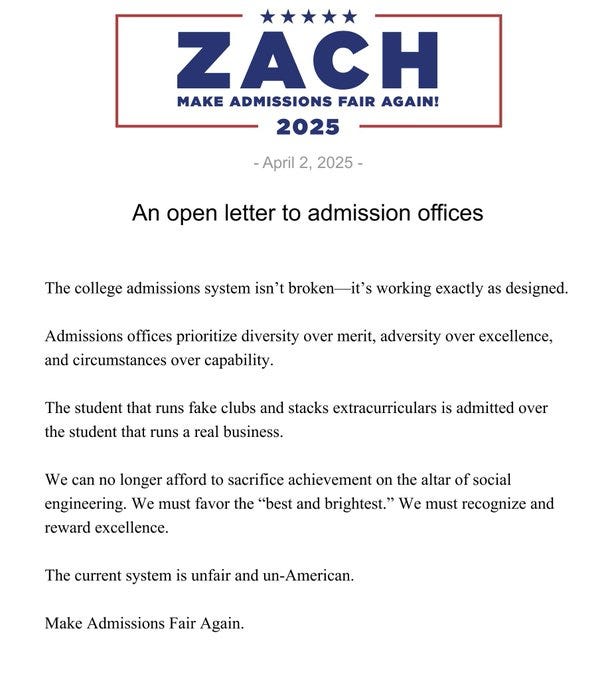A few days ago some poor kid crashed out on X because he got rejected from Harvard, Yale, Stanford, MIT, Duke, Princeton, Columbia, Cornell, Vanderbilt, UPenn, NYU, Brown, UT, UMaimi, UVA, USC, and WashU. The kid in question — Zach Yadegari, an 18-year-old tech millionaire who founded an AI-powered calorie-tracking company — proceeded to post a section of his personal statement, which clearly he thought he ate with.
As the haters were quick to point out, it was no wonder he’d been rejected. In literary terms, the essay was a mixed bag — it was really bad, that is, but surely not much worse than than the average college essay (example: “In my rejection of the collegiate path, I had unwittingly bound myself to another framework of expectations: the archetypal dropout founder. Instead of schoolteachers, it was VCs and mentors steering me toward a direction that was still not my own.”)
The main reason Yadegari was passed over, I assume, was that his essay gave serious main-character-of-Atlas Shrugged-vibes and showed signs that he probably/definitely intended to drop out of Harvard when blessing it with his presence grew dull, or of rejecting every offer for cool points.
(Wounded, Yadegari proceeded to post a Make Admissions Fair Again graphic and added, rather desperately, “What do you think @elonmusk?”).
Others offered a second, supplementary diagnosis: the reason Yadegari was rejected from nearly all his schools was that his personal statement used no fewer than ten em dashes, and, as such, was probably co-authored with GPT — the notorious Emily Dickenson stan.
I’m not sure Yadegari did rely on AI: his ellipses are inconsistent — sometimes three dots, sometimes four — and ‘rite of passage’ is misspelled as “right of passage”. (Freudian slip?) Of course, maybe Yadegari — an AI whiz — threw these details in to throw the admissions office off his scent; still, I assume it was mostly written by him.
Besides: if em dashes are evidence of AI use (since GPT uses them more often than human writers, on average), they can also be evidence that someone spends a lot of time reading AI generated text — which Yadegari presumably does — and has grown used to the dash by osmosis.
My friend
argued yesterday that em dashes are dashing. “Don’t listen to people who say that em dashes make you sound like ChatGPT.” She (?) goes on to recommend something called a “code snippet”, which enables one to type em dashes more easily. I’m still getting used to the fax machine, but I’m sure her advice is helpful.This post is a plea to all writers: we cannot allow the em dash to be sullied. When people like Yadegari are slated for dashing it off ten times in succession, its use becomes that bit more stigmatised. And when the em dash becomes stigmatised… that is like a 10% tariff on Goodness. The em dash is uniquely brilliant — a tightrope and a monkey bar, the Goldilocks Zone of pauses. And though there is much to be said for the semi-colon, we all know it is not the same.
When it comes to ChatGPT, the only way out is through — we must use more em dashes! Flood the zone with lines! Ensure that no GPT response could match the work of a Real Writer, so sparing are its dashes in comparison. When Yadegari’s haters come after us, do like Psalm 137:9 and dash them against the rocks!
You can just do things. I am going to do this:—






I prefer using Tibetan brackets ༺ ༻ and whatever they use this curlycue thingy for ࿐ as well as the Brahmi Lotus mark 𑁍 to set my writing apart from GPT. I also think the symbol sign (§) is due for a comeback.
American universities should ask for personal statements focused on academics. My Oxford (or UCAS, rather, since it’s the same for all unis) personal statement was about classics and ancient history. If I had freedom to write anything I wanted at 17, I might have written something far worse than this young man. Minus the em dashes. :)